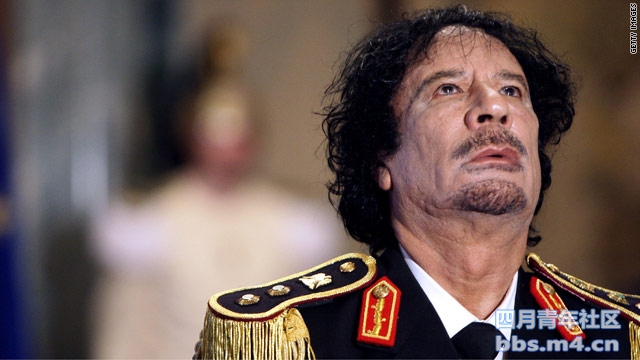|
|
http://globalpublicsquare.blogs.cnn.com/2011/08/21/what-happens-after-gadhafi/

Editor's Note: Moammar Gadhafi's final hours seem to be upon him. But what happens when he is captured or killed? CFR’s Center for Preventive Action asked Daniel Serwer, a professor at Johns Hopkins’ School of Advanced International Studies and a scholar at the Middle East Institute, to think through the challenges that a post-Gadhafi Libya would pose for the United States and its allies. Dan’s complete report is here. Below is a summary of that report, reprinted with the permission of the Council on Foreign Relations.
By Dan Serwer, CFR.org
After Gadhafi, the first challenge will be security. Failure to maintain public order is what got us into big trouble in Iraq, where Saddam Hussein’s “stay behind” operation stirred civic unrest and destroyed government buildings.
The murder in Libya last month of the overall rebel commander is a reminder that internecine warfare among the more than forty-five rebel militias is a real possibility.
People who lost family and tribal members to the Gadhafi regime may seek to settle scores. Former regime elements may seek to defend themselves and to “privatize” state assets. Criminals will see opportunities to traffic in arms, drugs and even people.
The humanitarian challenges will be no less daunting. Fighting has displaced at least half a million Libyans from their homes. Perhaps half of those are still in Libya, and many who are not will seek to return quickly once Gadhafi falls.
Food, water, shelter and health services need to be secured for the most vulnerable. In addition, keeping water and electricity flowing to the residents of Tripoli and other major urban centers will be vital to maintaining public order.
U.S. interests in Libya are limited, but a relatively successful transition from the Gadhafi regime to a united, stable, more open and democratic Libya would be seen in the region and more widely as a credit to the NATO-led intervention.
Read: Who is Saif Gadhafi?
It would also enable Libya to resume oil and gas exports, demonstrate the international community’s capacity to manage such transitions and encourage positive outcomes to other Arab Spring protests, including those in Yemen and Syria.
Failure to stabilize Libya could lead to chaos, breakup of the Libyan state that sets an unwelcome precedent elsewhere, or restoration of dictatorship.
These outcomes would all damage American and allied credibility and likely also cause major problems for our European allies, including shortfalls in energy supplies, loss of major investments and a continuing refugee flow. Refugees could also cause problems in Tunisia, Egypt, and the rest of the Mediterranean.
It is therefore the Europeans, along with the Arab League, who should take the lead in post-Gadhafi stabilization of Libya, under a clear United Nations Security Council mandate that recognizes a legitimate post-Gadhafi Libyan authority and sets out strategic goals for the transition.
Read: More CFR.org analysis of Libya.
The goals should include a united and sovereign Libya within its well-established borders that can sustain, govern and defend itself through inclusive democratic institutions, using Libya’s resources transparently and accountably for the benefit of all its people.
Quick deployment of a peacekeeping force of several thousand paramilitary police, mainly to keep order in Tripoli and other population centers, would help ensure these goals are met.
The European Union and its member states can deploy several hundred paramilitaries. Turkey and Arab countries might supply the remainder. An international peacekeeping operation would not administer Libya but would support an inclusive interim authority in maintaining stability, providing humanitarian assistance, and beginning the reconstruction process.
What if this does not work? NATO will need to be prepared to step in. Only as a last resort - to deal with widespread disorder, a threatened breakup of the Libyan state, or a humanitarian catastrophe - should the international community consider armed intervention without the invitation of a legitimate Libyan authority. This could mean U.S. boots on the ground, but only briefly as part of a broader multilateral effort.
Read: Gadhafi regime appears on the verge of collapse.
Leadership in post-Gadhafi Libya should be passed as quickly as possible to the Libyans, who have already set up local councils and a Transitional National Council, which help to organize and provide services in the liberated portions of the country. These indigenous institutions merit nurturing and support, including unfreezing of Gadhafi-era assets so that the councils in liberated areas can begin to meet the needs of their populations. The post-Gadhafi era has already begun there.
Libya is a resource-rich country with a relatively well-educated citizenry that has demonstrated courage under fire. The country lacks institutions and political experience, but not talent and commitment. The international community should prepare to support Libyan efforts to take charge of the country’s destiny once Gadhafi leaves the scene.
The views expressed in this article are solely those of Daniel Serwer.
Post by:
Daniel Serwer
|
|